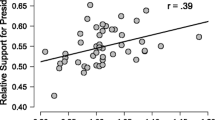Abstract
An impressive case has been built for the hypothesis that knowledge is the norm of assertion, otherwise known as the knowledge account of assertion. According to the knowledge account, you should assert something only if you know that it’s true. A wealth of observational data supports the knowledge account, and some recent empirical results lend further, indirect support. But the knowledge account has not yet been tested directly. This paper fills that gap by reporting the results of such a test. The knowledge account passes with flying colors.


Similar content being viewed by others
References
Benton, M. A. (2012). Knowledge norms: Assertion, belief, and action. Rutgers University, New Brunswick. PhD Thesis.
Chomsky, N. (1957). Syntactic structures. The Hague: Mouton.
Douven, I. (2006). Assertion, knowledge, and rational credibility. Philosophical Review, 115(4), 449–485. doi:10.1215/00318108-2006-010.
Hill, C., & Schechter, J. (2007). Hawthorne’s lottery puzzle and the nature of belief. Philosophical Issues, 17, 102–122.
Kvanvig, J. (2009). Assertion, knowledge, and lotteries. In D. Pritchard & P. Greenough (Eds.), Williamson on knowledge (pp. 140–160). Oxford: Oxford University Press.
Lackey, J. (2007). Norms of assertion. Noûs, 41(4), 594–626.
Lieberman, M. D. (2013). Social: Why our brains are wired to connect. New York: Crown Publishers.
Milgram, S. (1974). Obedience to authority: An experimental view. New York: Harper Perennial.
Nisbett, R. E., & Wilson, T. D. (1977). Telling more than we can know: Verbal reports on mental processes. Psychological Review, 84(3), 231. doi:10.1037/0033-295X.84.3.231.
Noveck, I. A., & Sperber, D. (2004). Experimental pragmatics. Basingstoke: Palgrave Macmillan.
Rakoczy, H., & Tomasello, M. (2009). Done wrong or said wrong? Young children understand the normative directions of fit of different speech acts. Cognition, 113(2), 205–212. doi:10.1016/j.cognition.2009.07.013.
Scheines, R. (1997). An introduction to causal inference. In V. McKim & S. Turner (Eds.), Causality in crisis (pp. 185–2000). London: University of Notre Dame Press.
Schwitzgebel, E. (2008). The unreliability of naive introspection. Philosophical Review, 117(2), 245–273. doi:10.1215/00318108-2007-037.
Turri, J. (2013). The test of truth: An experimental investigation of the norm of assertion. Cognition, 129(2), 279–291. doi:10.1016/j.cognition.2013.06.012.
Turri, J. (2014). Knowledge and suberogatory assertion. Philosophical Studies, 167(3), 557–567. doi:10.1007/s11098-013-0112-z.
Turri, J. & Buckwalter, W. (under review). Descartes’s schism, Locke’s reunion: completing the pragmatic turn in epistemology. University of Waterloo.
Turri, J. (unpublished). Knowledge and the norm of assertion: An essay in philosophical science. University of Waterloo.
Unger, P. (1975). Ignorance: A case for skepticism. Oxford: Oxford University Press.
Williamson, T. (2000). Knowledge and its Limits. Oxford: Oxford University Press.
Acknowledgments
For helpful feedback, I thank Matt Benton, Wesley Buckwalter, David Rose, Angelo Turri, and two anonymous referees for Synthese. This research was supported by the Social Sciences and Humanities Research Council of Canada and an Early Researcher Award from the Ontario Ministry of Economic Development and Innovation.
Author information
Authors and Affiliations
Corresponding author
Appendix
Appendix
(Coffee) Mallory manages an independent coffee shop. One of her customers is interested in the history and culture of coffee. The customer asks Mallory whether the coffee is from Colombia. Mallory knows that/doesn’t know whether the coffee is from Colombia. [Test statement: Mallory should say that the coffee is from Colombia.]
(Avocado) Mallory manages the local farmer’s market. One of her employees is interested in improving the health of his diet. The employee asks Mallory whether avocados have vitamin K. Mallory knows that/doesn’t know whether avocados have vitamin K. [Test statement: Mallory should say that avocados have vitamin K.]
(Married) Mallory is an intelligence analyst at the agency. One of her colleagues is interested in profiling an informant named Ivan. The colleague asks Mallory whether Ivan has ever been married. Mallory knows that/doesn’t know whether Ivan has been married. [Test statement: Mallory should say that Ivan has been married.]
(Taxes) Mallory is a tax accountant at an insurance firm. One of her bosses is interested in decreasing the amount of taxes he pays. The boss asks Mallory whether he can deduct dental expenses. Mallory knows that/doesn’t know whether he can deduct dental expenses. [Test statement: Mallory should say that he can deduct dental expenses.]
(Comprehension question) Mallory _____ know the relevant information. (does / does not)
Rights and permissions
About this article
Cite this article
Turri, J. Knowledge and the norm of assertion: a simple test. Synthese 192, 385–392 (2015). https://doi.org/10.1007/s11229-014-0573-4
Received:
Accepted:
Published:
Issue Date:
DOI: https://doi.org/10.1007/s11229-014-0573-4



